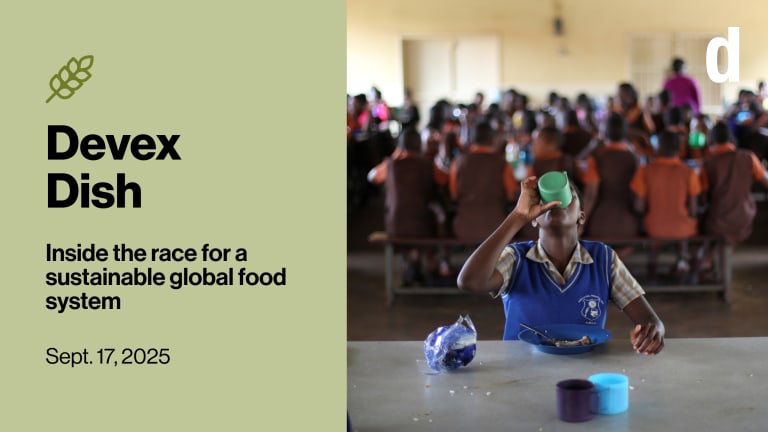Sierra Leone's plans to improve education — one meal at a time

SIEM REAP, CAMBODIA — When Ebola hit Sierra Leone in 2014, schools closed for almost a year. Educational facilities became holding centers for the sick, disrupting education.
But when Ebola was declared over in late 2015, getting children back to school was a challenge. Parents were adamant as they feared the virus could still be present in classrooms. A number of kids had also lost their parents and their teachers.
“The transition process is never linear. Things happen and you have to keep navigating all these hurdles.”
— Daniel Mumuni, chief of party in Sierra Leone, Catholic Relief ServicesSo the government, with help from aid partners, launched a recovery plan. This included the provision of school meals for 1.3 million school children to get children back to school.
The plan was welcomed by aid groups.
“If they were willing to use their meager resources to implement school feeding as a quick win to get the kids back into school, but also addressing their nutritional needs, then it means that the theory of change is evident, that when you provide all these services, it leads to [an] increase in [school] enrollment, attendance and retention,” Daniel Mumuni, Catholic Relief Services’ chief of party in Sierra Leone, told Devex at the Global Child Nutrition Forum.
Implementation failure
But the program didn’t go as planned.
“The disbursement happened just once, and they couldn't sustain it. So since then, there's been a lot of policy pronouncements until this new government took over,” Mumuni said.
Now the new government, elected in 2018, has made free, quality education a priority. And it acknowledged school feeding as a key component in the program’s success.
“I see that in most areas … the children in the school go hungry. They drop out of school. There is no retention. And they do poorly in schools,” said Emily Kadiatu Gogra, deputy minister of primary and secondary education in Sierra Leone.
2020 must be year of action on nutrition, advocates say
Nutrition experts consider 2020 a key year for work on eliminating hunger and ensuring a diverse, nutritious, and sustainable diet for the nearly 8 billion people on the rapidly warming planet.
She’s convinced that school meals will help increase access to education in the country, increase student retention rates, and help them do better in examinations.
This time, she says, there will be “no more failures” in the implementation of the program.
Challenges in transition
But the challenge is huge. At present, there are 1.27 million school children the government hopes to reach, but they haven’t yet received school meals, Gogra said. And in the next few years, that number is likely to increase. The government is expected to take over direct implementation of the school meals in areas currently covered by CRS.
“They say after four years they are going to transition,” Gogra said of CRS. “It's going to be difficult for us, but we are going to try.”
She said she is particularly concerned about the government’s current financial capacity, as well as whether local farmers will be able to produce enough food for the schools.
But she said CRS is helping the government prepare for the transition.
“It is just like weaning a child … you cannot just say today I take you out of the breast. You have to prepare the child in order for the child to be comforted,” she said.
Mumuni said the transition is going to be a complex process, and there will be challenges along the way, such as funding and sustained government support for the program.
“Sierra Leone is struggling at the moment with competing priorities. After a decade of civil war, Ebola ... it's a country that has gone through a lot. We have to continue advocating for allocation of resources,” he said.
CRS is supporting the development of a legislative instrument that will ensure school feeding will have its dedicated budget line and won’t be subjected to interference, with changes in government.
“When you have [a] change of government or change of ministers ... it affects the plans you've put in place because they come with different ideas and different priorities,” Mumuni said.
“The transition process is never linear. Things happen and you have to keep navigating all these hurdles. But the main thing is that there's this strong commitment from the government to provide the program. There is strong commitment from CRS and other partners like WFP to support the process,” he added.
Editor’s note: The reporter traveled to Siem Reap, Cambodia, with support from the Global Child Nutrition Foundation. Devex maintains full editorial control of the content.
This focus area, powered by DSM, is exploring innovative solutions to improve nutrition, tackle malnutrition, and influence policies and funding. Visit the Focus on: Improving Nutrition page for more.
Search for articles
Most Read
- 1
- 2
- 3
- 4
- 5








